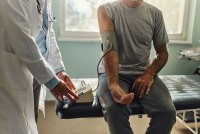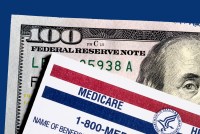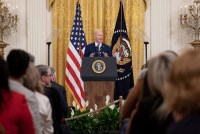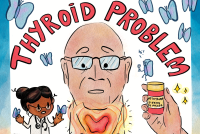Latest KFF Health News Stories
Se avecinan cambios para Medi-Cal en 2024, pero ¿beneficiarán a los pacientes?
A partir del próximo año, más de 700,000 inmigrantes sin papeles serán elegibles para una cobertura completa de Medi-Cal.
When a Quick Telehealth Visit Yields Multiple Surprises Beyond a Big Bill
For the patient, it was a quick and inexpensive virtual appointment. Why it cost 10 times what she expected became a mystery.
In New Year, All Immigrants in California May Qualify for Medicaid Regardless of Legal Status
In the new year, California’s Medicaid program will open to otherwise eligible immigrants ages 26 to 49 without legal residency. They will join children, young adults, and adults over 50 enrolled in Medi-Cal through previous expansions to residents lacking authorization. The change is expected to add over 700,000 first-time enrollees.
Los nuevos inscritos se sumarán a más de 655,000 niños, adultos jóvenes de hasta 25 años y adultos de 50 años y más que ya se han registrado en Medi-Cal a través de expansiones anteriores para residentes sin papeles.
Dodging the Medicare Enrollment Deadline Can Be Costly
As open enrollment ends, many people are tuning out. They could wind up with a surprise next year: higher costs and less access to health care providers.
Readers Slam Hospital Monopolies and Blame the Feds for Understaffed Nursing Homes
KFF Health News gives readers a chance to comment on a recent batch of stories.
Biden Wants States to Ensure Obamacare Plans Cover Enough Doctors and Hospitals
The regulatory proposal was announced Nov. 15 and is likely one of the last major ACA policy efforts of the president’s first term.
California’s Ambitious Medicaid Experiment Gets Tripped Up in Implementation
The health care insurers, nonprofit organizations, and other groups responsible for implementing Gov. Gavin Newsom’s ambitious plan to infuse Medicaid with social services say their ability to serve vulnerable, low-income Californians is hamstrung.
What the Health? From KFF Health News: Trump Puts Obamacare Repeal Back on Agenda
Although Republicans have never united behind a replacement for the Affordable Care Act, 2024 GOP presidential front-runner Donald Trump said this week he wants to put the issue back on the national agenda. That delights Democrats, who have won at least two elections partly by defending the now-popular health law. Meanwhile, the Texas Supreme Court takes up a case brought by women who say their pregnancy complications further endangered their health due to the vagueness of Texas’ near-total ban on abortions. Joanne Kenen of Johns Hopkins University and Politico Magazine, Sarah Karlin-Smith of the Pink Sheet, and Victoria Knight of Axios News join KFF Health News chief Washington correspondent Julie Rovner to discuss these issues and more. Also this week, Rovner interviews KFF Health News’ Rachana Pradhan, who reported and wrote the latest “Bill of the Month” feature.
Adultos mayores, detectives contra avisos engañosos de Medicare Advantage
Funcionarios de los Centros de Servicios de Medicare y Medicaid le han pedido a las personas mayores y a otros miembros de la comunidad que sean detectives contra el fraude, denunciando tácticas de venta engañosas al 800-MEDICARE.
Uncle Sam Wants You … to Help Stop Insurers’ Bogus Medicare Advantage Sales Tactics
The Biden administration wants to crack down on deceptive or misleading Medicare Advantage and drug plan sales tactics. It’s counting on beneficiaries to help catch offenders.
An Arm and a Leg: To Get Health Insurance, This Couple Made a Movie
On this episode of “An Arm and a Leg,” hear how a couple wrote and directed a short film, starring one of them — just to maintain health insurance through the actors union.
Medicare Advantage Increasingly Popular With Seniors — But Not Hospitals and Doctors
Some hospitals and physician groups are rejecting Medicare Advantage plans over payment rates and coverage restrictions, causing turmoil for patients.
El daño colateral de la crisis de Medicaid: miles están perdiendo beneficios de alimentos
Las familias de bajos ingresos que necesitan servicios como ayuda alimentaria y dinero en efectivo, se ven afectadas por la carrera burocrática para determinar si decenas de millones de personas aún califican para Medicaid.
Hospitals and Doctors Are Fed up With Medicare Advantage
Medicare Advantage plans are pretty popular with both lawmakers and ordinary Americans — they now enroll about 31 million people, representing just over half of everyone in Medicare, by KFF’s count. But among doctors and hospitals, it’s a different story. Across the country, provider grumbling about claim denials and onerous preapproval requirements by Advantage plans […]
Medicaid ‘Unwinding’ Makes Other Public Assistance Harder to Get
The bottleneck caused by states’ reevaluation of Medicaid enrollees has swept up low-income families that rely on other safety-net services.
Medicaid’s ‘Unwinding’ Can Be Especially Perilous for Disabled People
Earlier this year, Beverly Likens thought she’d done everything she needed to do to keep her Medicaid. Then came an unwelcome surprise: Ahead of surgery to treat chronic bleeding, the hospital said her insurance was inactive, jeopardizing her procedure. Likens had just been diagnosed with severe anemia and given a blood transfusion at the emergency room. “I […]
El altísimo costo de tener una enfermedad autoinmune en Estados Unidos
A pesar de ser muy frecuentes, encontrar ayuda para muchas enfermedades autoinmunes puede resultar frustrante y costoso.
Many Autoimmune Disease Patients Struggle With Diagnosis, Costs, Inattentive Care
Despite the prevalence of autoimmune conditions, like the thyroid disease Hashimoto’s, sometimes finding help can prove frustrating as well as expensive. There are often no definitive diagnostic tests, so patients may rack up big bills as they search for confirmation of their condition and for treatment options.
How the Thyroid Gland Mystifies Doctors and Patients
This illustrated report has been adapted from a KFF Health News article, “Many Autoimmune Disease Patients Struggle With Diagnosis, Costs, Inattentive Care” by Andy Miller, with artwork by Oona Tempest.





















